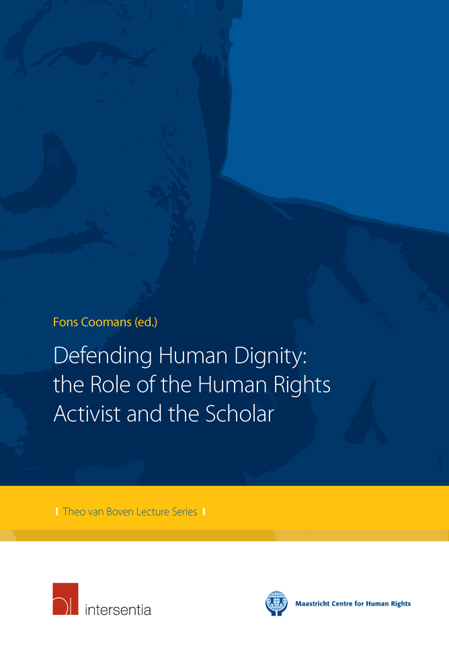Book contents
- Frontmatter
- Contents
- Miscellaneous Frontmatter
- 5th Annual Theo van Boven Lecture
- Defending Rights: Human Rights Defenders in the Front Line
- 6th Annual Theo van Boven Lecture
- Slavery and the Human Rights Scholars
- The Politics of Human Rights: Slavery and the Sustainable Development Goals
- Miscellaneous Endmatter
5th Annual Theo van Boven Lecture
Published online by Cambridge University Press: 27 September 2018
- Frontmatter
- Contents
- Miscellaneous Frontmatter
- 5th Annual Theo van Boven Lecture
- Defending Rights: Human Rights Defenders in the Front Line
- 6th Annual Theo van Boven Lecture
- Slavery and the Human Rights Scholars
- The Politics of Human Rights: Slavery and the Sustainable Development Goals
- Miscellaneous Endmatter
Summary
Introduction
On Wednesday 12 November 2014 the 5th Theo van Boven lecture was held at the Faculty of Law.
The 2014 lecture was delivered by Mrs. Hilani Jilani from Pakistan. The title of her address was “Defending Rights: Human Rights Defenders in the Front Line”. Human rights defenders are persons, groups or organisations who stand up and speak out for respect and protection of human rights. They denounce human rights violations by states and non-state actors. In many cases human rights defenders have been subject to harassment, threats, arrest, detention, unfair trials, ill-treatment and sometimes killings. Mrs. Jilani was the first Special Representative of the United Nations Secretary-General on Human Rights Defenders from 2000–2008. This position performs an important protective function where human rights of defenders are at risk.
Hina Jilani is internationally recognised for her expertise in critical human rights investigations. In February 1980 with her sister Asma Jahangir, she co-founded Pakistan's first all-female legal aid practice, AGHS Legal Aid Cell (ALAC) in Lahore. Initially the activities were confined to providing legal aid to women, but gradually these activities increased to including legal awareness, education, protection from exploitation, legal research, counselling and providing legal assistance as well. She is also one of the founders of the Human Rights Commission of Pakistan and the Women's Action Forum (WAF) (a pressure group established in 1980 campaigning against discriminatory legislation) and also founded Pakistan's first legal aid centre in 1986. A lawyer and civil society activist and active in the movement for peace, human rights and women's rights in Pakistan for the last three decades, she specialises in human rights litigation, and is especially concerned with the human rights of women, children, minorities, bonded and child labour, political and other prisoners. She has conducted several cases which have become landmarks in setting human rights standards in Pakistan. In July 2013, she joined The Elders, a group of statesmen, peace activists and human rights advocates, brought together by Nelson Mandela.
- Type
- Chapter
- Information
- Defending Human DignityThe Role of the Human Rights Activist and the Scholar, pp. 7 - 8Publisher: IntersentiaPrint publication year: 2016



